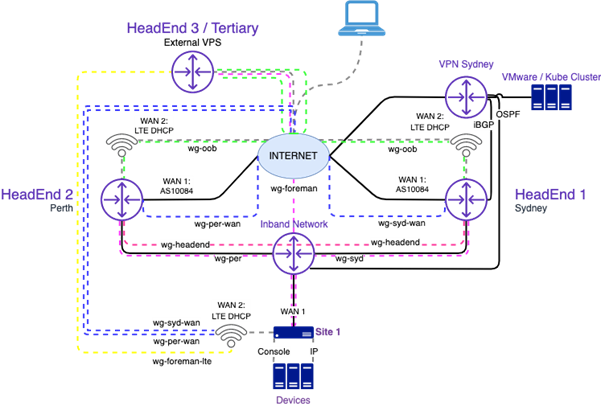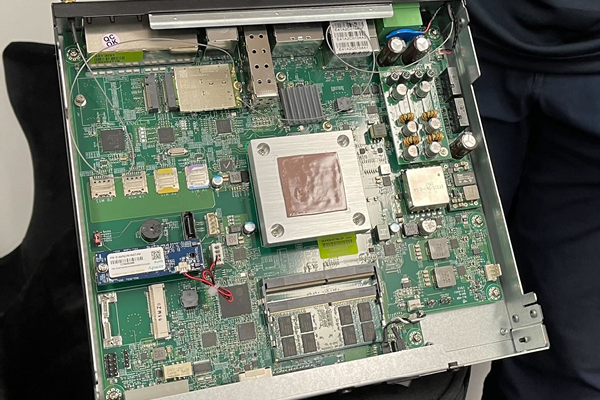IAA Newsletters
This month’s Meet the Member segment features one of our fantastic Board members, Nate Garr. Nate currently works as a Senior Network Acquisitions Planner for Amazon IVX / Twitch and joined IAA as a Corporate member when he worked for a previous organisation where he was pleased to see that the best performing IX was IAA. According to Nate, “the coverage and number of peers being one factor, but the operational efficiency and support we received set the team at IAA apart.” He subsequently became a Board Member in 2019 as he wanted to start giving back to the Internet community.
Nate, by default, fell into the Internet industry around 1996 as a former telecommunications technician, with his first venture into the industry deploying circuit switches throughout the western USA. This was, of course, in support of the Public Switched Telephone Network (PSTN), while the Internet was in its infancy, but SS7 switching and seeing his first Cisco router being commissioned meant there was no turning back.
Nate started his career installing Nortel DMS systems in support of the PSTN, then transitioned into a technician role for a regional ISP/CLEC in Northern California. Right around that time (circa 1998) a large start-up was funded to deploy the “first ever” all fibre optic IP network in the United States (Level 3 Communications) – it was the scale and commitment to packet-based tech that drew him to that opportunity. The next 11 years were a mix of IP engineering, colocation product development, and ultimately running operation teams in the field. He also took turns committing to other areas of regional and local communication service organisations and spent time deploying a significant amount of carrier ethernet/MPLS supported services to cell towers. The capacity they needed as users started feeding off their phones was what led him to content and organisations caching and serving it.
Taking his operations/engineering background to both sales support and acquisition (sourcing buying) has rounded out his experience in our industry. From deploying some of the first POPs for Fastly’s content distribution network throughout APAC/Oceania to securing intercity dark fibre in support of facilities-based backbone initiatives for AWS, it really comes down to a love of network development, peering/interconnection and vendor relations. Seeing first-hand the amount of capital and effort it takes to build a network, and the general support (is it love?) for our Internet, is what drives his commitment to peering and pulling networks together. His primary objective today is site selection in support of the Twitch service and the ever-budding growth of Amazon’s IVS/Twitch product!
Nate is not only passionate about his work but is an avid outdoors enthusiast that was ultimately drawn to rivers. During his 20’s and 30’s, when he wasn’t working, you’d find him enjoying white-water kayaking. He’s had the pleasure of experiencing nature’s more difficult and breath-taking waterways across the entire Americas, Nepal, Thailand and China. These days, while the heart is willing, the body tends to wear its tear, so the white-water has tamed down a bit.
Now a proud father of two young boys, with his wife, as a family they enjoy much of their time finding ways to navigate those particular forms of nature while they reside in beautiful Eagle, Idaho in the United States.
Read More
It’s official, Wednesday, 24 August 2022 at 9:00am AEST / 7:00am AWST is the launch date for phase one of the new IAA Member Portal. After more than 18 months of planning, designing, coding and testing, the new portal will be rolled out across three phases, with each phase containing new and upgraded features.
Emails will be sent out to members giving important information on what to expect over the coming weeks. Members are reminded to keep an eye out for the important ‘Getting Started’ email coming on Wednesday, 10 August 2022, that will help make your transition to the new portal as easy as possible.
We’re also planning to release some teaser videos on our social media channels, so stay tuned to catch a glimpse of what you have to look forward to!
Read More
We’ve given our Services webpage a bit of a work over and given our technical peering information a page of its own. Thanks to member feedback, we have launched a new and improved Technical Guide on our website. This new page includes information on IX technical etiquette, allowed traffic types, BGP communities for controlling prefix propagation via the route servers and to our content caches, and much more. All members are encouraged to check out this new page, and as always, your feedback is appreciated.
Read More
We are preparing to refresh our existing fleet of route server hardware. The new servers will use 2 x 10G-LR fibre links to diverse switches in a Layer 2 bonded configuration for improved resilience against planned and unplanned network outages. We look forward to giving you more information on the upcoming works, so stay tuned to our newsletters and socials.
Read More
IX Australia’s new out-of-band (OOB) network has officially been commissioned and is now being used in production! Powered by ZPE’s NodeGrid devices and utilising state-of-the-art technologies such as WireGuard VPNs, this solution replaces the original OOB network that was running on end-of-life equipment. The new solution (high-level overview shown below) includes three redundant head-ends with LTE cellular connectivity, including one hosted completely external to our networks. This ensures access to all of our devices in the worst possible events, including those resulting in the direst of outages. The new network has already come in handy with a recent outage involving an OSPF process failure on one of our WA-IX switches – watch out for an upcoming blog post that will discuss this further.

Read More
Well, here we are entering into a new financial year already. The team have been hard at work completing a few projects from last year, as well as the final phases of testing on our new member portal! It all looks so elegant and simple, it’s hard to see the huge amounts of effort that have gone into the layout, neat new calculators and extra functionality! That’s the secret of good design, really, isn’t it. We’re also just about to announce our new switch vendor to take our core to the next level: once again, all the hard work the team have put into avidly testing and configuring (not to mention deliberately misconfiguring) will yield us a significant extra capacity. Fingers crossed the supply chains will deliver before we do actually hit some ceilings.
One surprise I did get this month, and not a pleasant one, was the announcement of new obligations for cyber security reporting. While we knew they were in the pipeline, we had expected a bit more discussion and even negotiation before they came into effect. Indeed, the message that these obligations were not coming into immediate effect was repeated by the Department of Home Affairs in their briefing to affected industries held on 30 June 2022. A week later, the Minister declared a new licence condition for carriers and carriage service providers to establish a mandatory reporting regime for cyber security incidents, with the federal government using provisions in the Telecommunications Act to bring the industry into line with other critical infrastructure sectors. Just when we thought there was a new Sheriff in town… Thankfully our team is on the ball, and you’ll see new guides on our web site to explain what you need to do.
Happy new year everyone
Narelle
Read More
How do ISPs meet their lawful intercept obligations? In this online session we will hear from Richard Nelson, Shane Alcock (Uni of Waikato) and Dave Mill (Searchlight), as well as IAA’s Sophia Joo, where they will explore the requirements of lawful intercept within the Australian context and demonstrate an open source approach to meeting your obligations.
Date: Tuesday, 16 August 2022
Time: 1-2pm AEST / 11-12pm AWST
Location: Online via Zoom (registration opens 18 July)
Read More
We are excited to introduce Kyle Zrinski, our new PHP Developer. Working with the tech team, he will be a vital contributor to our new IAA Member Portal.
Before joining IAA, Kyle worked as a Desktop IT Support Technician and is currently completing a degree in Information Technology at ECU.
Kyle brings a real passion for software development which is heavily integrated with the Internet, and is excited to move into the Internet industry, seeing it as an exceptional opportunity to learn and grow professionally.
In his spare time, Kyle enjoys tinkering with hobby electronics and 3D printers, designing projects such as smart plant pots and logic puzzles – you may even find him tearing up the racetrack or working on cars!







